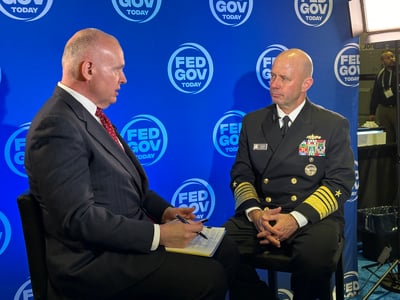April 14, 2024
Presented by Interos & Carahsoft
This program was filmed on location at Sea-Air-Space by W2 Communications
Navy Under Secretary Outlines Key Priorities for 2025: Readiness, Family Support, and Industry Partnerships
 At the Sea-Air-Space conference, Erik Raven, the Under Secretary of the Navy, detailed key initiatives in the 2025 budget that prioritize readiness, personnel welfare, and industry partnerships. Raven emphasized the strategic importance of the submarine industrial base and the collaboration with the UK and Australia through the Orcas project to enhance undersea warfare capabilities. The budget also includes significant investments in family support programs and quality of life improvements for service members. Additionally, Raven underscored the tighter integration of Navy and Marine Corps operations, focusing on amphibious warfare and technological innovations aimed at rapid deployment of new technologies in operational settings.
At the Sea-Air-Space conference, Erik Raven, the Under Secretary of the Navy, detailed key initiatives in the 2025 budget that prioritize readiness, personnel welfare, and industry partnerships. Raven emphasized the strategic importance of the submarine industrial base and the collaboration with the UK and Australia through the Orcas project to enhance undersea warfare capabilities. The budget also includes significant investments in family support programs and quality of life improvements for service members. Additionally, Raven underscored the tighter integration of Navy and Marine Corps operations, focusing on amphibious warfare and technological innovations aimed at rapid deployment of new technologies in operational settings.
Key Takeaways:
-
Enhanced Support for Military Families: The 2025 budget addresses quality of life for service members and their families through increased support for child care, improvements in barracks, and other family-oriented initiatives.
-
Investment in Submarine and Technological Advancements: Significant funding is allocated to strengthen the submarine industrial base and foster advancements in technology, including a new initiative called the Disruptive Capabilities Office, which aims to fast-track the implementation of new technologies in naval operations.
-
Integration and Expansion of Naval Capabilities: The budget supports the integration of the Navy and Marine Corps with investments in amphibious ships and new warships, ensuring alignment with broader Department of Defense initiatives for the Indo-Pacific region and beyond.
Interos CEO Jennifer Bisceglie Discusses the Critical Evolution of Supply Chain Management in Business Reputation and Resilience
 Jennifer Bisceglie, CEO and founder of Interos, highlighted the heightened relevance of supply chain management in today's business environment, particularly post-pandemic. She pointed out that businesses are now more accountable for their supply chains due to increased scrutiny from both the public sector and consumers. Bisceglie explained that companies are required to understand and mitigate various risks including financial, cybersecurity, geopolitical, and catastrophic risks to maintain operations during crises. She emphasized the need for continuous monitoring and leveraging technology to adapt quickly to changing circumstances, reflecting a significant shift from traditional practices to a more dynamic approach in managing supply chains.
Jennifer Bisceglie, CEO and founder of Interos, highlighted the heightened relevance of supply chain management in today's business environment, particularly post-pandemic. She pointed out that businesses are now more accountable for their supply chains due to increased scrutiny from both the public sector and consumers. Bisceglie explained that companies are required to understand and mitigate various risks including financial, cybersecurity, geopolitical, and catastrophic risks to maintain operations during crises. She emphasized the need for continuous monitoring and leveraging technology to adapt quickly to changing circumstances, reflecting a significant shift from traditional practices to a more dynamic approach in managing supply chains.
Key Takeaways:
-
Increased Accountability: Businesses are no longer able to ignore their supply chains; the pandemic has underscored the need for robust management systems to ensure timely fulfillment of orders and operational continuity.
-
Risk Management Diversity: Companies must address multiple types of risks—financial, cybersecurity, environmental (ESG), geopolitical, and catastrophic—to maintain a resilient supply chain.
-
Technological Integration: The use of advanced technology is crucial for real-time monitoring and management of supply chains, allowing companies to react swiftly to disruptions and maintain secure operations.
Vice Chief of Naval Operations ADM James Kilby Highlights Strategic Initiatives for Enhanced Naval Efficiency and Learning
 Vice Chief of Naval Operations ADM James Kilby discussed the Navy's strategic approach to becoming a more effective learning organization. He emphasized the importance of accountability and data-driven decision-making to improve performance across various naval operations, including nuclear shipyard maintenance and recruiting. ADM Kilby highlighted the Navy's focus on learning from past mistakes, such as shipyard fires, to prevent future losses. He also detailed efforts to enhance real-time data analysis in combat scenarios, particularly in the Red Sea, to swiftly adapt and improve operations. The Navy's goal is to maintain a continuous state of improvement, leveraging data to ensure readiness and operational excellence.
Vice Chief of Naval Operations ADM James Kilby discussed the Navy's strategic approach to becoming a more effective learning organization. He emphasized the importance of accountability and data-driven decision-making to improve performance across various naval operations, including nuclear shipyard maintenance and recruiting. ADM Kilby highlighted the Navy's focus on learning from past mistakes, such as shipyard fires, to prevent future losses. He also detailed efforts to enhance real-time data analysis in combat scenarios, particularly in the Red Sea, to swiftly adapt and improve operations. The Navy's goal is to maintain a continuous state of improvement, leveraging data to ensure readiness and operational excellence.
Key Takeaways:
-
Enhanced Learning from Past Mistakes: The Navy is focusing on transforming past failures into learning opportunities to avoid repeating mistakes, particularly highlighted by incidents like the USS Miami and USS Bonhomme Richard fires.
-
Data-Driven Operations: Emphasizing the importance of data in naval operations, ADM Kilby noted the need for reliable data sources and thoughtful data utilization to improve decision-making and operational effectiveness.
-
Continuous Improvement and Accountability: The Navy is implementing strategies such as 'Perform the Plan' to ensure ongoing accountability and enhance daily operations, with a focus on achieving clear, measurable goals across all levels of the organization.

-1.png?width=980&height=90&name=FGT%20728%20x%2090%20px%20(980%20x%2090%20px)-1.png)
Please fill out the requested information below